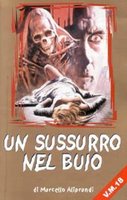 I'm on the fence about Marcello Aliprandi's 1976 film A Whisper in the Dark. Tiffany, can you help me out a little here?
I'm on the fence about Marcello Aliprandi's 1976 film A Whisper in the Dark. Tiffany, can you help me out a little here?"Coulda been so beautiful...coulda been so riiiiight..."
Thanks, T.
Meet the surnameless, large, Italian aristocrat family: dad Alex is a bit of a playboy, wife Camilla seems a bit distracted and high-strung, governess Francoise is secretly in love with Alex and cuddles with one of his pilfered shirts at night, Camilla's mother, The Countess, is a stuck-up high society dame who uses a cigarette holder and adds to her daughter's anxiety. Then there's the children: bratty twins Milena and Mathilde, their 12-year old brother Martino, and his imaginary friend Luca.
Most people in the family tease Martino about his friend, or get outright fed up with Martino's "Luca doesn't like the plum jam, he wants the peach jam" bull. Camilla, however, is convinced he's telling the truth:
I believe that children relive our memories. If not...how come my son named his invisible brother with the same name I'd chosen for my lost child- Luca?Yup, it seems that Luca is the ghost of Camilla's baby, born prematurely and dead soon thereafter- events that happened before Martino was born. Does Luca exist in reality, or only in Martino's mind? What exactly does Luca want? He wants "to be loved, at any cost" according to Martino. Sounds ominous, eh? And when a psychiatrist who wants to take Martino away for treatment (Joseph Cotten, in little more than an extended cameo) winds up dead, it seems Luca will soon be running the show.
Alas, thatidea never comes to fruition. The movie starts out with much promise as we learn more and more about Luca. In fact, in the opening scenes, Martino talks about a dream he had in which he received a letter from his brother. Luca writes:
Finding yourself in a place full of horrible people, my brother, is the most frightening thing about death.I was expecting some serious back-from-beyond-the-grave action after that, and for a while it seemed that the film was building towards...something. While we never saw Luca himself, director Aliprandi frequently used a subjective camera as the dead child began to interact with people besides Martino. In addition, there were some nice spooky goings-on: swings moving on their own, a red balloon floating along a wooded path, a ball that comes to a stop when Luca is playing goalie, Mathilde balancing on a high balcony ledge at the urgings of her dead brother...but ultimately nothing panned out. I waited for Luca to get down to business and cause some real damage, but I guess he wimped out.
Towards the end, the A Whisper in the Dark meanders into a big fat pile of "What the-?" as Camilla decides that she'll be the one to take care of Luca once and for all. She leads the ghost through a fog-enshrouded, snowy garden to a gate and then...well, who knows. It's a beautiful-looking scene, but then Camilla wakes up and there's no more fog, no more snow, and we have no clue what the hell is going on. The movie ends as it began, with the family at breakfast. Martino still claims that Luca is bitching about his jam choices, and that's pretty much that.
I suppose one could deconstruct the film and analyze it as a metaphor for family, motherhood, sexuality, and any other dry, boring-ass topic one wishes. That's easier to do, however, when the film is coherent and successful on its most basic level, as is Nicolas Roeg's Don't Look Now, from which Aliprandi borrows heavily. A Whisper in the Dark is alot of wasted potential, a notion which tends to bum me out more than a straight-up flop would. Hey Hollywood, why don't you remake something that could actually be improved upon, rather than genre classics like The fucking Fog? Hmm? I'm talkin to you, Hollywood! In the end, it saddens me...but I must give A Whisper in the Dark a mere 6 out of 10 close but no cigars. Coulda been so beautiful, indeed.










No comments:
Post a Comment